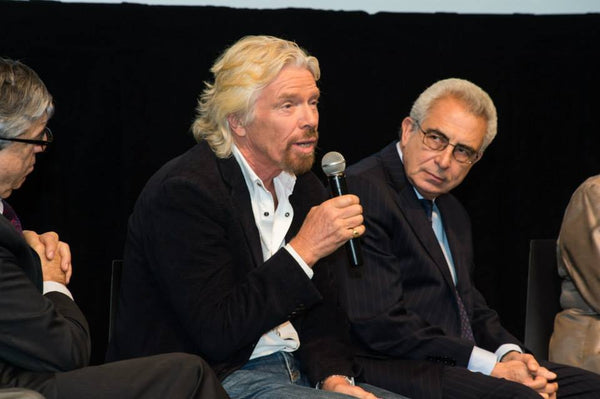
Virgin boss and record-breaking entrepreneur extraordinaire Sir Richard Branson has appeared in front of the Home Affairs Select Committee’s inquiry into the War on Drugs following his time on the Global Commission for Drug Policy.
From the article at Telegraph.co.uk:
By Richard Branson
Just as prohibition of alcohol failed in the United States in the 1920s, the war on drugs has failed globally. Over the past 50 years, more than $1 trillion has been spent fighting this battle, and all we have to show for it is increased drug use, overflowing jails, billions of pounds and dollars of taxpayers’ money wasted, and thriving crime syndicates. It is time for a new approach.
Too many of our leaders worldwide are ignoring policy reforms that could rapidly reduce violence and organised crime, cut down on theft, improve public health and reduce the use of illicit drugs. They are failing to act because the reforms that are needed centre on decriminalising drug use and treating it as a health problem. They are scared to take a stand that might seem “soft”.
But exploring ways to decriminalise drugs is anything but soft. It would free up crime-fighting resources to go after violent organised crime, and get more people the help they need to get off drugs. It’s time to get tough on misguided policies and end the war on drugs.
Totally Failed
I was fortunate to be part of the Global Commission for Drug Policy, along with the former US Secretary of State George Shultz, former UN Secretary-General Kofi Annan, President Cardoso of Brazil and the likes of the former UN High Commissioner for Human Rights, Louise Arbor, and the former chairman of President Obama’s Economic Recovery Advisory Board, Paul Volcker. We studied international drug policy over the past 50 years, and found that it has totally failed to stop the growth and diversification of the drug trade. Between 1998 and 2008, opiate use increased by more than 34 per cent, even as prison populations swelled and profits for drug traffickers soared.
As these grim trends show, the two strategies at the core of drug control policy have been ineffective. First, prohibition and enforcement efforts have failed to dent the production and distribution of drugs in any part of the world. Second, the threat of arrest and punishment has had no significant deterrent effect on drug use.
Unless this issue is tackled now, countless individuals and families will continue to suffer, no matter how much money is spent. We need a debate on how policy can cut consumption and reduce harm, rather than inflammatory scaremongering. It is not about supporting drug use; it is about solving a crisis.
Drugs are dangerous and ruin lives. They need to be regulated. But we should work to reduce the crime, health and social problems associated with drug markets in whatever way is most effective. Broad criminalisation should end; new policy options should be explored and evaluated; drug users in need should get treatment; young people should be dissuaded from drug use via education; and violent criminals should be the target of law enforcement. We should stop ineffective initiatives like arresting and punishing citizens who have addiction problems.
Prison More Expensive
The next step is simple: countries should be encouraged to experiment with new policies. We have models to follow. In Switzerland, the authorities employed a host of harm-reduction therapies, and successfully disrupted the criminal drug market. In Portugal, decriminalisation for users of all drugs 10 years ago led to a significant reduction in heroin use and decreased levels of property crime, HIV infection and violence. Replacing incarceration with therapy also helped create safer communities and saved the country money – since prison is far more expensive than treatment. Following examples such as these and embracing a regulated drugs market that is tightly controlled and complemented by treatment – not incarceration – for those with drug problems will cost taxpayers a lot less. Even with these examples, we do not yet know what will work best. New policies should be evaluated according to the scientific evidence. But we can say now that these policies should focus on the rights of citizens and on protecting public health. Drug policy should be a comprehensive issue for families, schools, civil society and health care providers, not just law enforcement.
Little Impact
To evaluate such policies, we should stop measuring their success according to such indicators as numbers of arrests, prosecutions and drug seizures, which turn out to have little impact on levels of drug use or crime. We should instead measure the outcomes in the same way that a business would measure the results of a new ad campaign. That means studying things like the number of victims of drug-related violence and intimidation, levels of corruption connected to the drug market, the amount of crime connected to drug use, and the prevalence of dependence, drug-related mortality and HIV infection. Many political leaders and public figures acknowledge privately that repressive strategies have only made the drug problem worse. It took 14 years for America’s leaders to repeal Prohibition. After 50 years of the failed drug war, it is time for today’s leaders to find the courage to speak out.
Failed Enterprise
For all the successes I’ve had in business, I’ve also learnt to accept when things go wrong, work out why, and try to find a better way. The war on drugs is a failed enterprise. We need to have the courage to learn the lessons and move on. Sir
Richard Branson is the founder of the Virgin Group of Companies, as well as the global action activist group The Elders, which counts Nelson Mandela Desmond Tutu, and Jimmy Carter as its members.






Leave a comment